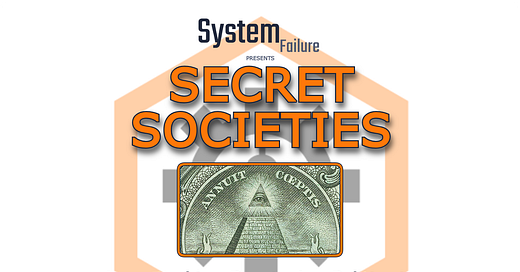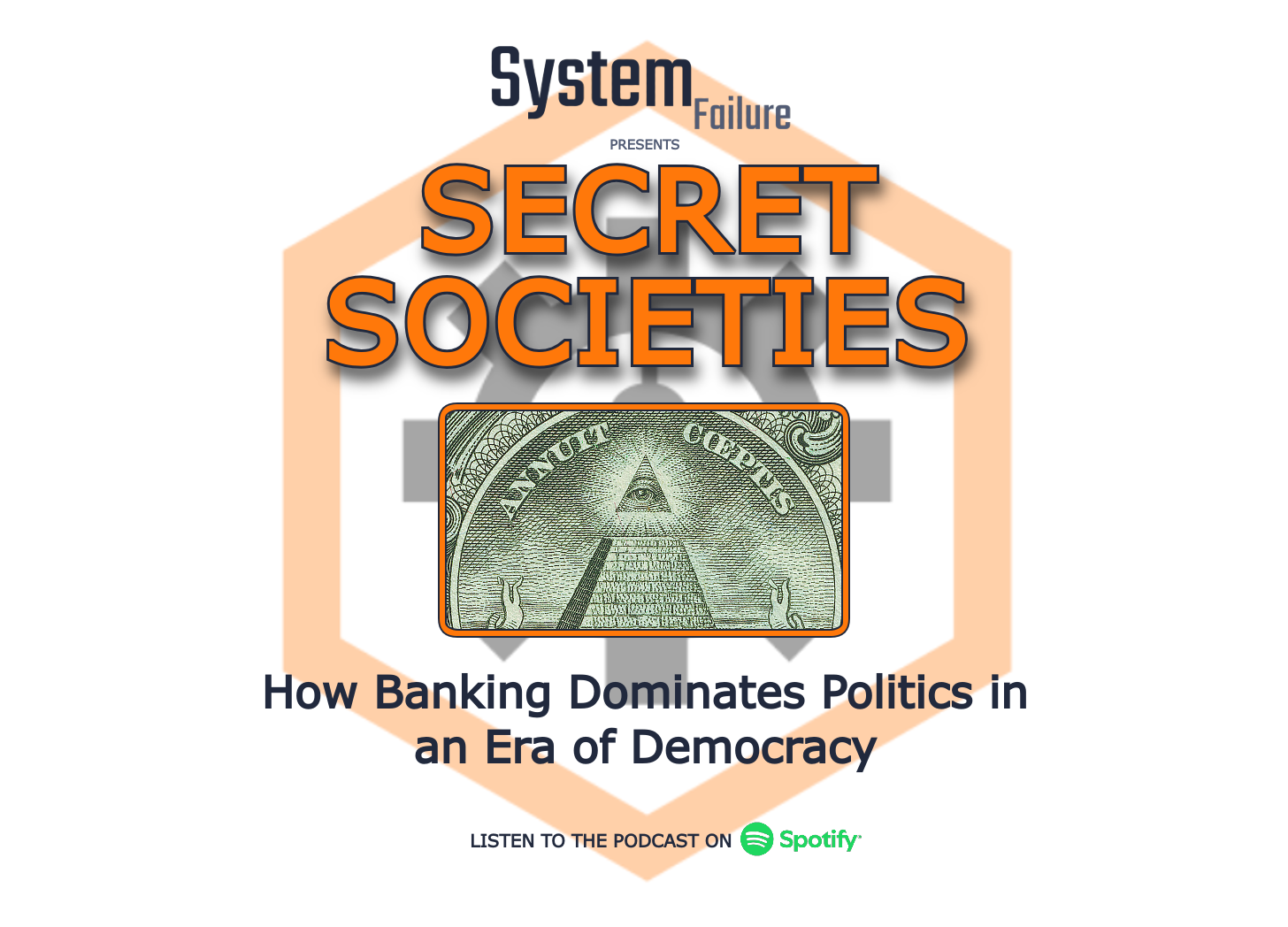Overview
With this essay, we conclude Volume II of the System Failure constellation of ideas. Follow our progress on the Idea Map and Essay Schedule.
Suspicion of the banking sector has grown considerably since 2008, when mortgage banks exploded in all our faces. But most people still don’t realize who our real masters are. Bankers dominate the politics of our modern era, as the Popes once dominated the Middle Ages in Europe, and the Romans once dominated the known world.
But unlike their predecessors, bankers rule from behind-the-scenes. There have been many secret societies with rumored connections to banking houses, such as the Knights Templar, the Freemasons, the Rosicrucians, the Bavarian Illuminati, the Skull and Bones, and the Bilderberg Group. Secrecy makes the exact nature of these societies opaque and hard to pin down. The internet, as usual, is rife with misinformation.
Therefore, System Failure is content to merely speculate about a possible connection between the Knights Templar and the Freemasons, who share much symbolic overlap. This essay contains an oblique reference to that conspiracy theory, but steers clear of wandering any further afield by focusing on the actual mechanics of compound interest, and a well-known historical anecdote involving famed British banker Nathan Mayer Rothschild…
Introduction
Throughout history, those who’ve challenged power have greatly enhanced their safety by forming secret societies. In modern times, the powerful have also adopted secrecy because modern people have come to expect democracy. Few are willing to tolerate rule by god-kings like the Caesars anymore. Or by religious authorities like the Pope. Today, secrecy and deception are indispensable to the banking houses that dominate modern international politics.
The Roman Empire
During the centuries when Rome had emperors, it was no secret. Those emperors wanted to be recognized far and wide. They went so far as to commission giant statues of themselves; the Colosseum in Rome is called that because a 200-foot “colossus” of the emperor Nero used to stand nearby. It was not uncommon for the emperors of Rome to demand to be worshiped as gods; they were anything but subtle.
Conversely, early Christians hid themselves from view because Roman authorities persecuted their religion. They secretly practiced their Holy Eucharist rite in secluded locations, such as among the skeletons in Rome’s creepy underground catacombs. They operated as secret societies to protect themselves from the wrath of emperors like Nero.
The Middle Ages
While the Fall of Rome ran its course and the Italian peninsula lapsed into economic chaos, Christianity exploded in popularity. That religion was originally financial in nature, and the apocalypse it prophesied eerily matched the economic collapse Romans were living through at the time. In the finale, the last emperors of Rome were obliged to adopt the new faith and declare it the state religion of the dying empire.
The oligarchy of the shrinking empire slowly merged with leaders of the early Christian Church. The Bishops of Rome started calling themselves “pontiffs”, a name derived from Pontifex Maximus, one of the emperors’ many titles that made them high priests of the old pagan state religion.
But unlike the Caesars, the Popes didn’t set up an extractive tax regime through raw military power. Instead, they leveraged belief. The Church claimed an inside connection with God, and it amassed great wealth by monetizing this perceived monopoly on access to the divine. This so-called “sale of indulgences” got so shameless that it became a major cause of the Protestant Reformation. Where the Caesars once took power by sheer force, the Popes consolidated power by taking advantage of the contents of people’s minds.
For ideological enemies of the Church, it was scarcely any safer in the Middle Ages than it had been for early Christians living under Nero. It was illegal to disagree with the Church, and those convicted of heresy were brutally punished.
The Knights Templar were a famous example. These warrior monks protected pilgrims during the Crusades by pioneering international banking practices. Their lending activities made them so wealthy that their rising power and influence threatened the Pope, who condemned the banking knights as heretics in 1307. While the Knights Templar in France were tortured and killed, their counterparts in the British Isles formed secret societies and lived as outlaws, just like the early Christians.
The Modern Era
For three centuries, the surviving banking knights relied on secrecy to protect themselves from further persecution. Meanwhile, the Protestant Reformation culminated in the brutal Thirty Years War, and the resulting Treaty of Westphalia severely curtailed the political power of the Pope in 1648. No longer fearing persecution from Rome, those banking knights soon emerged from hiding as Freemasons and founded the Bank of England in 1694. But they did not abandon their secretive ways…
The Bank of England was effectively the world’s first central bank. Gradually, bankers consolidated political power by taking over the issuance of currencies in countries around the world. Over the past three centuries, bankers have come to dominate international geopolitics as the Popes and the Caesars once did.
Democracy
The great arc of history has seen humankind progress from master/slave societies like Rome, through the lord/peasant societies of the Middle Ages in Europe, to the modern employer/employee economies we recognize today. There have been almost as many setbacks as successes. But bottom-up, democratic decision-making has slowly replaced the top-down power dynamics that once characterized human society. This gradual inversion of power is perhaps the broadest trend in human history.
Bankers don’t consolidate power and wealth through raw military might, the way the Caesars did. Nor can bankers enforce a religious monopoly across international borders the way the Popes could.
That’s because the public has come to expect at least the pretense of democracy, and the hoarding of staggering wealth under conditions of nominal democracy is a delicate political pirouette to execute. For better or for worse, electorates can always use their vote to correct gross wealth disparities. Bankers avoid that outcome by embracing the secrecy from which they emerged; deception and misdirection are crucial tools in their toolbox.
Banking
Consider compound interest, the exponential calculation by which bankers make money. People lack good intuitions when it comes to exponential rates. When asked to imagine a piece of paper folded in half 100 times, our brains picture something about as thick as an old phone book. But in reality, doubling the thickness of a piece of paper 100 times would yield a wad thicker than the known universe.
Similarly, people don’t realize that taking out a 30-year mortgage at 5.299% means that, by the time that mortgage is paid off, you will have purchased a home for yourself and a home for your bank. 5.299% is the rate at which the total interest paid equals the principal on a 30-year loan. At that rate, a $500,000 home costs $1 million.
Complaining about taxes has been a time-honored tradition since the earliest days of the Agricultural Revolution. But in modern times, the property tax you pay to your duly elected authority is dwarfed by the cost of the interest on your mortgage. Few realize that the tribute we owe to bankers is far more significant than the tribute we owe to our elected governments.
As the Popes once monetized a monopoly on access to the divine, so bankers now monetize a monopoly on access to currency. If you need money, you must buy it from the banks, and interest is the price they demand. But only those who bother to sit down and fill out an amortization table realize just how high that price is. This is just one example of how deception and misdirection do heavy lifting for bankers.
The Rothschilds
The pages of history provide us with another example of banking deception and misdirection. In June of 1815, the Duke of Wellington defeated Napoleon at Waterloo. London banker Nathan Mayer Rothschild made a fortune off that battle when one of his messengers was able to deliver news of Napoleon’s defeat a full 24 hours before Wellington’s own courier reached London.
At that time, British bonds were called consols (short for consolidated annuities), and they were traded on the floor of the London stock exchange. Rothschild started aggressively selling his consols, making other traders believe that Britain had lost the war. That started a panicked selloff, and the price of consols collapsed. At that moment, Rothschild reversed course and bought back all the consols he could, at a steep discount. After word reached London that Wellington had actually prevailed, consols shot up to an even higher value than before the war. When all the dust had settled, Rothschild had increased his holdings by 20 times and possessed a stranglehold on the British economy.
In that same year, Nathan Mayer Rothschild made his famous statement, “I care not what puppet is placed upon the throne of England to rule the Empire on which the sun never sets. The man who controls Britain’s money supply controls the British Empire, and I control the British money supply.” His quote reflects the same truth that filling out an amortization table reveals; we are actually ruled by banks and not by representative governments.
Conclusion
The slave economy of Rome, ruled by the Caesars, came to a notorious end. The peasant economy of Europe—presided over by Popes during the Middle Ages—also had an expiry date. And it’s a historical certainty that the sun will also set on our modern economic paradigm of employers and employees. It’s only a matter of time. Because of the proliferation of democracy, the modern bankers who today dominate international geopolitics have adopted all the secrecy and misdirection that historically protected the opponents of power. Secrecy allows our modern ruling class to preserve a status quo that richly benefits them. They’ve effectively dammed up the great river of history by delaying the natural flow of human society into its next great era.
Further Materials
In 1810 Nathan Rothschild (1777-1836) established in London a branch of the firm that his father, Meyer Amschel Rothschild, had founded in Frankfurt-am-Main. Nathan seems to have been the ablest of the financial geniuses who distinguished the family through several centuries and in many states. He became the favorite intermediary of the British government in its financial relations with foreign powers; it was he or his agents who transmitted from England to Austria and Prussia the subsidies that enabled them to fight Napoleon; and he played a leading role in the industrial and commercial expansion of England after 1815.
Will & Ariel Durant, The Age of Napoleon, 1975, page 360





